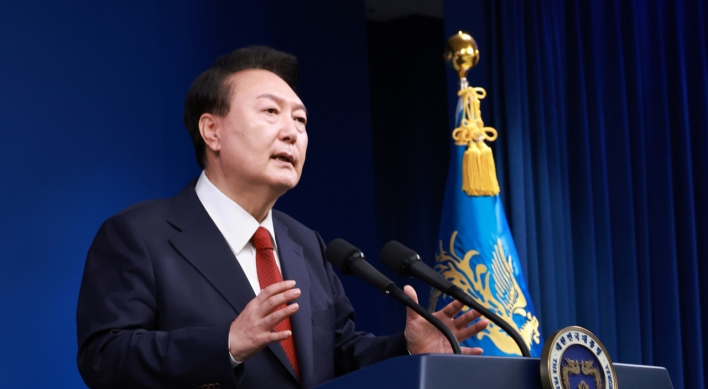Elderly parents seen moving away from relying on sons for support: study
By KH디지털2Published : Feb. 2, 2017 - 16:06
Unlike the traditional patriarchal family structure where filial duties predominantly rest with the sons, particularly the eldest one, elderly parents in South Korea are now leaning toward equal contribution from sons and daughters, a recent survey shows.
According to a joint study conducted by Korea Institute for Health and Social Affairs and Seoul National University’s Institute for Social Development and Policy Research, 38.5 percent of the elderly parents surveyed said that they want either a son or daughter to take care of them, up nearly 8 percentage points from a decade ago.
Some 30 percent of said children -- regardless of their gender -- should equally share the responsibility, up from 25 percent in a 2006 survey. The percentage of people who said the eldest son should be chiefly responsible moved from 28.8 percent to 22.5 percent over the same period.
According to a joint study conducted by Korea Institute for Health and Social Affairs and Seoul National University’s Institute for Social Development and Policy Research, 38.5 percent of the elderly parents surveyed said that they want either a son or daughter to take care of them, up nearly 8 percentage points from a decade ago.
Some 30 percent of said children -- regardless of their gender -- should equally share the responsibility, up from 25 percent in a 2006 survey. The percentage of people who said the eldest son should be chiefly responsible moved from 28.8 percent to 22.5 percent over the same period.

Historically, the eldest son took over family leadership and inherited the wealth when the father died and was responsible for taking care of his aged parents, often living together with them.
The poll, conducted on 1,052 adults across the country in 2016, pointed to a broader change taking place in the patriarchal family values, not just in expected roles for filial duties.
When asked who among their family members they contact most frequently, about 36 percent of the elderly parents said that they meet, call, message or video chat with the eldest daughter the most, followed by the eldest son (33.8 percent), second or other sons (14.4 percent), second or other daughters (12.9 percent) and the first daughter-in-law (0.9 percent).
In 2006, the eldest son was the most frequently contacted person to the elderly parents, followed by the eldest daughter, the second or other sons and the second or other daughters.
The same study also found that more South Koreans, noticeably young people and women, are putting less emphasis on family and marriage, compared to a decade ago.
Some 46.4 percent of the surveyed agreed that married women are happier than single women in 2016, compared to 57.1 percent in 2006
Moreover, 78.1 percent of the respondents said the authority of a father should be honored in any occasion, 6.2 percentage points lower than 10 years earlier. The survey also showed that 69.7 percent of respondents said family should come before themselves in 2016, compared to 79.9 percent in 2006.
Nearly half of the respondents, mostly those in their 20s and 30s, said in 2016 they have no objection to living with a partner while not married. The survey showed that 54.5 percent said they would live with someone of the opposite sex out of wedlock.
The survey also showed that most respondents believe 30 is the most suitable age for both men and women to tie the knot.
By Kim Da-sol (ddd@heraldcorp.com) & Yonhap
The poll, conducted on 1,052 adults across the country in 2016, pointed to a broader change taking place in the patriarchal family values, not just in expected roles for filial duties.
When asked who among their family members they contact most frequently, about 36 percent of the elderly parents said that they meet, call, message or video chat with the eldest daughter the most, followed by the eldest son (33.8 percent), second or other sons (14.4 percent), second or other daughters (12.9 percent) and the first daughter-in-law (0.9 percent).
In 2006, the eldest son was the most frequently contacted person to the elderly parents, followed by the eldest daughter, the second or other sons and the second or other daughters.
The same study also found that more South Koreans, noticeably young people and women, are putting less emphasis on family and marriage, compared to a decade ago.
Some 46.4 percent of the surveyed agreed that married women are happier than single women in 2016, compared to 57.1 percent in 2006
Moreover, 78.1 percent of the respondents said the authority of a father should be honored in any occasion, 6.2 percentage points lower than 10 years earlier. The survey also showed that 69.7 percent of respondents said family should come before themselves in 2016, compared to 79.9 percent in 2006.
Nearly half of the respondents, mostly those in their 20s and 30s, said in 2016 they have no objection to living with a partner while not married. The survey showed that 54.5 percent said they would live with someone of the opposite sex out of wedlock.
The survey also showed that most respondents believe 30 is the most suitable age for both men and women to tie the knot.
By Kim Da-sol (ddd@heraldcorp.com) & Yonhap








![[KH Explains] Can tech firms' AI alliances take on Nvidia?](http://res.heraldm.com/phpwas/restmb_idxmake.php?idx=644&simg=/content/image/2024/05/07/20240507050619_0.jpg&u=)








![[K-pop’s dilemma] Time, profit pressures work against originality](http://res.heraldm.com/phpwas/restmb_idxmake.php?idx=652&simg=/content/image/2024/05/08/20240508050705_0.jpg&u=20240508171126)
![[K-pop’s dilemma] Can K-pop break free from ‘fandom’ model?](http://res.heraldm.com/phpwas/restmb_idxmake.php?idx=642&simg=/content/image/2024/05/09/20240509050541_0.jpg&u=)